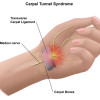
I specialize in the medical management of various musculoskeletal disorders such as gout, tendinitis, carpal tunnel syndrome, osteoarthritis, etc., rheumatologic autoimmune diseases (ie rheumatoid arthritis, systemic lupus erythematosus, scleroderma, dermatomyositis), and metabolic bone diseases (osteoporosis, osteomalacia, Paget’s disease).


